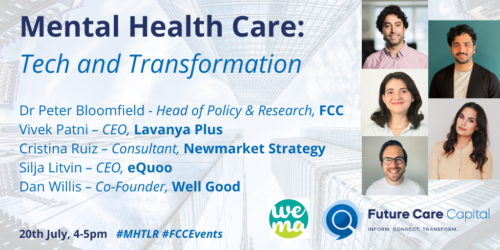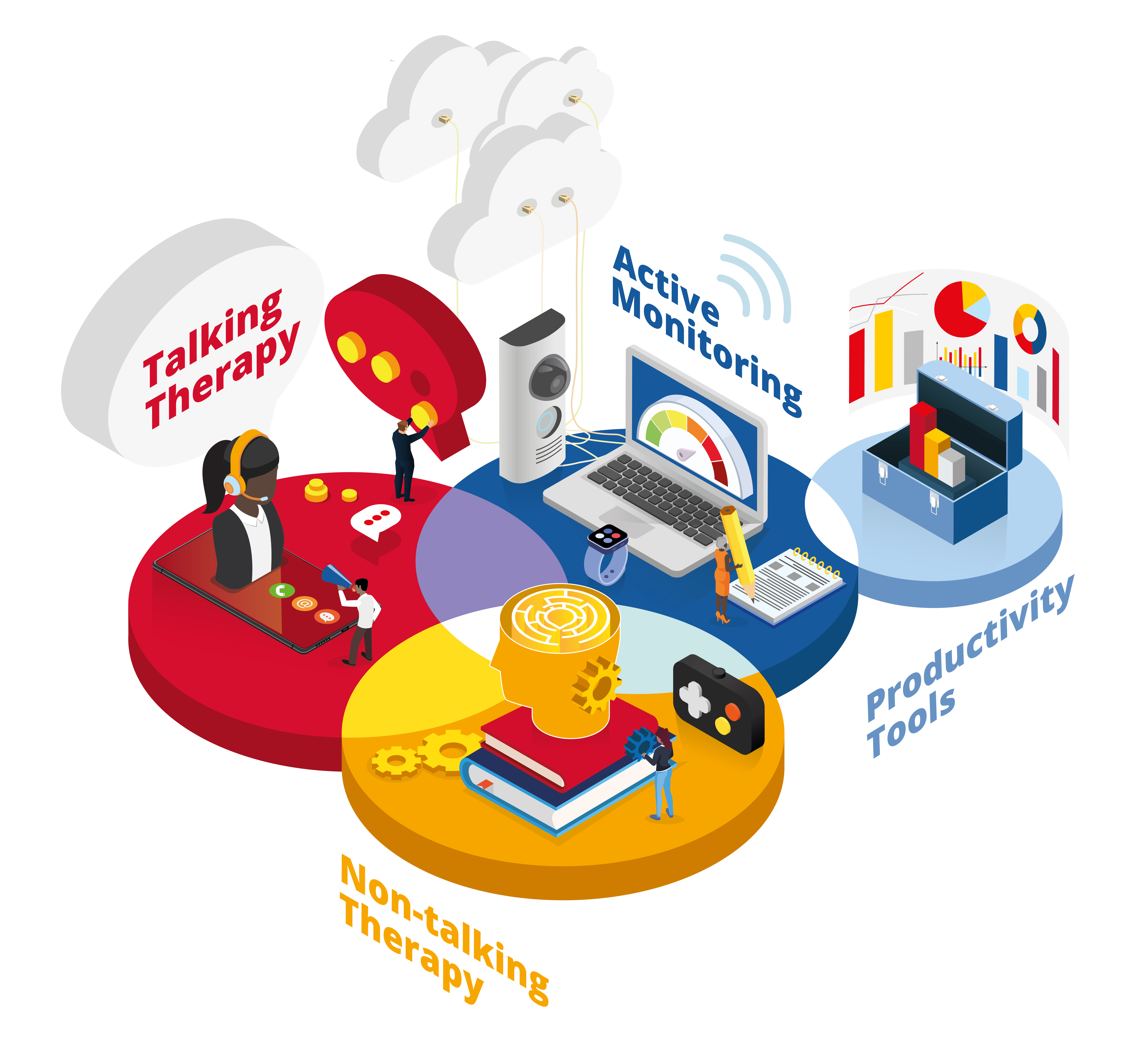
latest
Mental Health Care: Tech and Transformation event summary
A collaborative approach is needed to solve mental health care provision

It’s not all about money and profit – investors are reluctant to get on board if start-ups can’t scale up.
Yes, the problem of attracting funding was undoubtedly top of the list of problems a panel of business entrepreneurs said were holding back the development and adoption of technology in UK mental health care.
But, despite that, innovative solutions are flourishing, as the panellists’ stories demonstrated at Future Care Capital’s event, Mental Health Care: Tech and Transformation, a follow-up to the publication of its new research report, The Mental Health Tech Review, published earlier this month.
Panellists offered real evidence of success from their own business experience, for patients and the workforce alike.
“This ranged from gamification to help reduce anxiety, to workplace messaging-bot integrations for mental health improvement, to consultancy improving social care workforce wellbeing.
Their real life examples backed up some of the report’s key findings.
However, the report’s joint authors Dr Peter Bloomfield (FCC’s Head of Policy and Research) and Cristina Ruiz de Villa (Consultant, Newmarket Strategy) admitted they were surprised by some of their research findings – such as the limited scope for “targeted interventions.”
Describing the mental health tech landscape outlined in the report, Peter said there was a small niche of mental healthcare companies using technology in an innovative way, but this was tiny in comparison to healthcare or other digital sectors.
Targeted support and intervention were needed to grow the sector to provide an adequate range of companies to suit the needs of all individuals – care is not one size fits all, and neither are tech solutions. The panellists agreed. One panellist also highlighted that there are many different types of therapist and mental health support worker and a single app or solution will not be sufficient to address such specific needs.
The panellists were:
- Vivek Patni, CEO, Lavanya Plus and WeMa
- Cristina Ruiz de Villa, Consultant, Newmarket Strategy (and report co-author)
- Silja Litvin, CEO, eQuoo
- Dan Willis, Co-founder, WellGood
Stressing the need for new ideas and solutions to tackle the huge scale of mental health care post-Covid, Peter challenged whether tech was always the right solution.
The panellists gave examples of their tech successes but agreed that a hybrid approach to mental health care solutions should be the way forward.
WellGood provides an “employer engagement and happiness tool for the workplace”. Dan Willis, whose personal experience of bipolar and frustration with platforms and wellbeing apps because of their “reactive nature”, led to his co-founding of WellGood two years ago. Dan said: “Wellbeing apps are popular, but they do not solve the root cause of an issue.”
An ambassador for the charity, MIND, he added: “We look to prevent mental health crises. We take away the burden off employees and place responsibility back on employers for duty of care.”
eQuoo is an emotional fitness game app. Now a successful company, Silja Litvin, a clinical psychologist, said: “We learned the hard way. Sometimes it’s hard to look outside the box and see new things.
“We don’t have to re-invent the wheel, we just need to look at our target audience and see what they are using.”
“The biggest limitation we have is simply financial.”
WeMa is a person-centred digital platform combining a care concierge service and online marketplace which helps informal carers access local care, health and wellbeing services. It can demonstrate how it’s reduced absenteeism and cut companies’ costs.
WeMa’s CEO Vivek Patni said: “Tech has to complement some level of human intervention.”
Peter said: “Coming up with new ways to maintain good mental health in a preventative way will be as essential as providing tools for acute care, and we believe tech has a significant role to play.”
Key messages:
- There are good opportunities for mental health tech to support patients, the NHS workforce and the provision of adult health and social care, particularly post-Covid.
- Most technologies are replicating or scaling existing models of care, rather than exploring new, complementary ways of providing care. There are gaps in the types of technologies being developed, where further research is needed.
- A collaborative approach that involves clinicians and end users will be well placed to produce solutions that better address systems and user needs.
- Targeted support and intervention (not just funding) is needed to grow the sector. A bespoke assessment mechanism for digital care technologies would be an additional driver for the development and uptake of mental health technologies.
You can access a recording of the event, by clicking here.
Vivek Patni, CEO of WeMa and the event’s Headline Sponsor, shares his thoughts on the event:
I had been surprised by the review’s finding that the number of people seeking access to mental health services decreased during the pandemic. My own experience is that, on the contrary, people are enquiring more. Perhaps people are realising that if they do need, for example CBT, it is probably going to be a six-month wait time for them to get any treatment.
For me, the key takeaways from this event are around how we address the issues of digital inclusion, people’s isolation, the knowledge gap that surrounds digital technologies, and the real need to combine digital assistance with human interactions.
Digital inclusion is hugely important due to its absence in some communities – and amongst different generations – and this has real world consequences for overall care outcomes. Moving forwards, the question we must ask ourselves is how is technology going to support people who speak different languages, or people from diverse communities, or amongst those with different belief systems and ways of coping with pressures? Mental health support for young teenagers who may be dealing with school or social media related challenges will be very different to those for people in their 50s and 60s who could be dealing with the problems of ageing parents and illnesses.
Through my own experience leading WeMa, I have first-hand insights into elderly people – a group prone to isolation – who have become hard to reach and miss out on care opportunities. So, whilst the development of technology is important, we must also focus on digitally excluded communities and how future technology will address those individuals who do not have the support of a digital framework around them.
Such disparities can only be tackled by delivering a combination of technological and human interaction. Technology certainly aids the navigation of care pathways, but it is the timing and expertise of human intervention – working in tandem with the tech – that will ensure the delivery of the best care outcomes.
Delivered people, supported by technology. WeMa is very much about providing people with the right service provider alongside the actual clinical therapeutic type of mental health service. It has to be people first. “People before technology”. Technology just helps us do it better.

